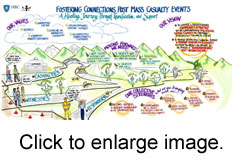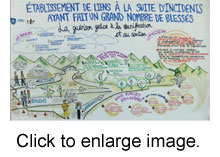Post Event Recovery Initiative
Exercise Target Red focused on the impact of being involved in and/or responding to a mass-casualty incident. These incidents are often traumatic with little advance warning, thus, there is limited opportunity to plan for immediate need or to communicate with family and friends. The existing research indicates the impact of this trauma can be reduced when first responders and support responders work together to offer Psychological First Aid during and immediately after the incident. For Exercise Target Red, researchers developed training and resources to support responders in these efforts. In doing so, the researchers and Expert Advisory Group members (convened for the purpose of bringing expertise and oversight for the exercise) became aware of the benefits for those involved in a Mass-Casualty Incident (MCI) to connect at a later time in order to receive additional information, emotional support, and/or to express gratitude and thanks.
Currently in British Columbia, while there are excellent examples of ad hoc and informal initiatives to enable casualties, bystanders, and responders to connect post-event, there are no formalized or established mechanisms. The SIMTEC Project Team, based on research and interviews with numerous individuals and organizations, concluded this is a serious gap in service that warrants the development of formal policy and supporting processes. Importantly, there is a willingness within government agencies, responder networks, and community non-governmental organizations to collaborate and to generate and action opportunities to fill this gap. The SIMTEC team, along with members of our Expert Advisory Group, conducted preliminary research on how strategies might be operationalized to provide these services using a two-pronged approach—an administrator to generate awareness and manage the database and a coordinator/broker to facilitate any requests to connect post-event.
To move this initiative forward, the SIMTEC research team hosted a multi-agency/multi-disciplinary session to explore and strategize how to build the business case for a mechanism to connect casualties, bystanders, and responders post-event. The agenda was designed to garner maximum input using a strength-based SOAR Analysis framework. This framework uses an appreciative inquiry approach to guide meaningful, solution-focused conversations aimed at identifying and leveraging strengths and opportunities. Specifically, the goals of the workshop was to explore the benefits and logistics of connecting post-event; thus enabling casualties to receive group support for themselves or for casualties and responders to connect to share gratitude and assist in their healing journey to manage the psychosocial impacts of MCIs.


